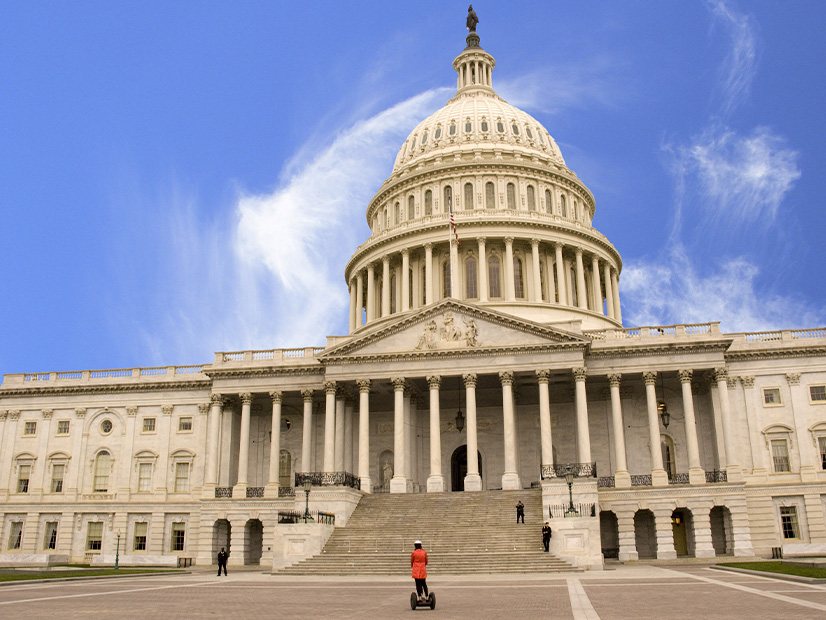
House Republicans this month are moving a package aimed at changing the country’s energy permitting processes, but it lacks changes to a key area backed by Democrats and many in the power industry: electric transmission.
House Speaker Kevin McCarthy (R-Calif.) introduced HR 1, the Lower Energy Costs Act, last week, which includes a package of reforms to the National Environmental Policy Act and is largely aimed at oil and gas production and mining.
McCarthy gave the bill the number HR 1 because it is the House GOP’s top priority this Congress, he said last week. The Committee on Rules is already taking amendments on the package and could move the bill onto the floor by next week.
“Every time we need a pipeline, road, or dam, an average of almost 5 years and millions of dollars in costs get added to the project to comply with Washington’s permitting process,” McCarthy said. “That’s too long. We can streamline permitting and still protect the environment. That’s a goal worthy of the number one.”
American Petroleum Institute President Mike Sommers last week wrote a letter to House leaders from both parties in favor of the Republican package.
“One particular focus of API and our members is enacting serious, bipartisan permitting reform,” Sommers said. “Too many projects have been scuttled because of onerous regulations and uncertainty. The delays and denials of permits, stemming from lengthy regulatory reviews and drawn-out judicial proceedings, have stifled needed investments and increased costs.”
American Clean Power said HR 1 includes “important provisions and reforms” that will speed up the deployment of clean energy in the U.S.
“Failure to enact critical permitting reforms and lift barriers that are hindering our ability to build much-needed transmission puts an estimated 150,000 clean energy jobs at risk,” ACP President Jason Grumet said in a statement. “We look forward to working with Congress to build on this important effort.”
The package is full of ideas Republicans have been debating in recent Congresses and represents what that caucus wants to see happen on energy, said former FERC chairman and Hogan Lovells Senior Adviser Neil Chatterjee. The bill is likely to pass the House with Republican support and maybe a few Democrats too.
“It’s also an opening offer to negotiation with the Senate,” Chatterjee said in an interview. “And I think, ultimately, to the extent that something gets done specifically on permitting reform, I think the Senate is going to drive that. So, we just have to see what can get the votes in the Senate and also get a majority in the House.”
Any permitting reform that passes both chambers is likely to be narrower and will require some tradeoffs between Democrats who want to focus on expanding clean energy and Republicans who favor fossil fuels. Chatterjee said that partisan split does not make sense, but recent events have only solidified it.
‘Easier Said Than Done’
The Inflation Reduction Act (IRA) included a number of provisions that Chatterjee supported as a Republican, but he was always critical of the fact that Democrats passed it without Republican support.
“My frustration was that it was done in a partisan manner,” Chatterjee said. “This is what this is, what I was concerned about, is that to the extent it became a political football, you wouldn’t get a whole lot of cooperation to make sure it’s implemented properly.”
Republicans did not include any provisions aimed at transmission in HR 1 because it would only help to implement the IRA and they have no incentive to help Democratic policy become a reality, he added.
“I think there is some willingness on the Republican side in both chambers to pursue transmission as part of a bipartisan bill,” Grid Strategies President Rob Gramlich said in an interview. “But I don’t I don’t think people are seeing HR 1 as really the bipartisan effort that includes transmission.”
Any bipartisan bill would have to include provisions that speed up the pace of transmission development significantly, and many climate hawk Democrats will have to decide whether any deals they cut lead to long-term emissions cuts, Gramlich said.
“I think there’s a lot of interest in more of a bright line authority for FERC on their permitting, something similar to Sen. [Sheldon] Whitehouse’s SITE Act, which has 1000-MW bright line,” said Gramlich.
Sen. Whitehouse (D-R.I.) in the last Congress introduced the Streamlining Interstate Transmission of Electricity Act, which would give FERC new siting authority for large, interstate lines.
FERC and DOE currently split some backstop siting authority, but that process requires NEPA reviews at both agencies and can take a long time. The arrangement has been in place since 2005 and has never been used to successfully site a transmission line.
Sen. Kevin Cramer (R-N.D.) is a former state regulator who knows the transmission issues well and will likely be key to getting Republican support for any reforms in that area, Chatterjee said. But there is still a question of whether FERC would have the appetite to use that authority.
“I’ve heard both former Democratic and Republican commissioners say this: that even if FERC had enhanced authority in this area, I think they’d be reluctant to do it,” Chatterjee said. “It’s just easier said than done to roll over the states on something this sensitive and this complicated.”



